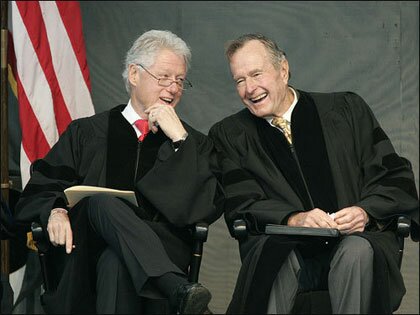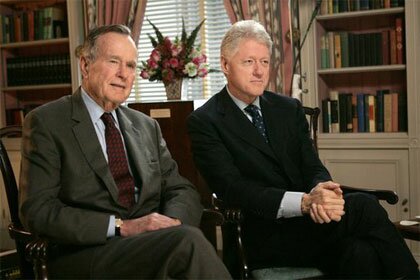VDB Suggests a Little Light Reading for George Clooney and Leonardo Dicaprio
We here at VDB remain a bit skeptical of the rumors suggesting that George Clooney and Leonardo Dicaprio plan to make a major motion picture depicting Howard Dean’s seminal 2004 White House bid.

True, Dean’s campaign paved the way for bold new political use of the Internet, but in our experience films wound around computer technology tend to fall notoriously flat on the big screen.
Every ’90s techno-thriller had a scene where a hero waited tensely for a secret file to download; every one had a chase scene immediately following, in which guys in black running behind the hero shouted “Get the disc!” into their wrist microphones.
Those crude plot devices did little to cover up the essential unsexiness of computer technology, and the good-hearted geeks who enable it.
We can’t help but imagine the climactic scene in the Dean movie: aides clustered around a computer screen, watching fundraising numbers exceed expectations.
TALL AIDE (gasping): “That’s a shitload of money, dudes.”
LOVE INTEREST: “This will show Time magazine!”
SHORT AIDE: “What’s that smashing noise at the door?”
AGENTS IN BLACK (shouting into wrist mics): “Get the disc! Get the disc!”
But God forbid we be the wet blanket at the party.
And so, we’d like to offer Clooney and Dicaprio some as they’re hammering out a script: Mousepads, Shoe Leather, and Hope: Lessons from the Howard Dean Campaign for the Future of Internet Politics, edited by Zephyr Teachout and Tom Streeter.
 For anyone with a taste for Dean-era lore, Mousepads is essential reading. Editor Tom Streeter very wisely directed all the contributors to lean heavily on narrative, on stories, and that focus helps the volume remain compelling throughout. The collection opens, in fact, with a short interview with Dean himself, drawing together in very usable form his own memories of that moment.
For anyone with a taste for Dean-era lore, Mousepads is essential reading. Editor Tom Streeter very wisely directed all the contributors to lean heavily on narrative, on stories, and that focus helps the volume remain compelling throughout. The collection opens, in fact, with a short interview with Dean himself, drawing together in very usable form his own memories of that moment.
And honest to God, some of Dean’s stories do sound like the stuff of a feature-length film: the Essex Lounge meet-up in NYC, for instance, where nearly six hundred people showed up and took over the block outside the bar.
Dean doesn’t disappoint when it comes to straight talk, either: he credits Republicans for leading the way back to grassroots populism, even as he makes it clear that he holds the nature and the tone of their message in contempt.
Still, Jerome Armstrong’s essay, while great fun for those involved in politics and blogging and the social networking debates, makes clear the challenge for Clooney and his crew.
“How a Blogger and the Dean Campaign Discovered Each Other” retells Armstrong’s contacts with the Dean campaign, how Armstrong moved from the outside, to the fringe, to the real action.
And for us it was completely involving.
But the account moves ahead almost entirely by quoting from email, blog posts, and comment strings; it’s the stuff of links, IP addresses, and emoticons. Required reading for anyone with an interest in blogging, or the new hopes of the Democratic Party, but with little to offer, we’d think, for Saturday afternoon matinee goers.
But the book wasn’t written for them, anyway.

Teachout and Streeter have put together something more like a cross between a tool-kit and a New Testament for progressive web activists and Dean aficionados, and damned if we didn’t enjoy it twice as much as Crashing the Gates.
Okay, that’s not saying so much. But you see what we mean.





